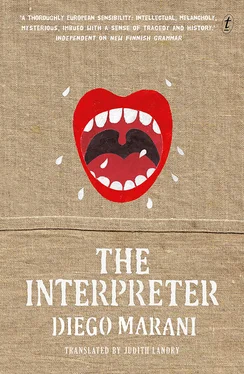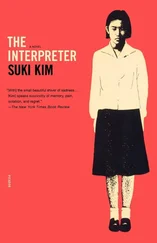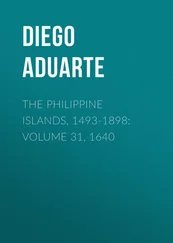One afternoon we stopped in a small town near the Hungarian frontier, eating hamburgers in the car. The weather was strangely mild; on the rust-coloured hills, at the edges of muddy fields the odd bush was becoming white with blossom. A misty plain stretched out to either side of the road, an unforgiving landscape touched with spring. I opened the car door and breathed in the pungent smell of a canal.
‘The train to Cluj stops not far from here. Your things will still be in the hotel. You can tell the police the whole story; your clients from the Bistrita factory can testify that I held you prisoner,’ I suggested, turning to look at her. A light wind lifted her hair.
‘Is that what you want, for me to go?’ she asked, her mouth full of hamburger.
‘That’s the only way you can save yourself,’ I said quietly, looking away. Still chewing, she gave me a suspicious stare, then screwed up the greasy paper and threw it out of the window.
‘Save myself? What from?’
‘From a future you don’t deserve. From me, from the death sentence I’m dragging behind me!’
‘No one will save me from this hour of the afternoon, when the light hurts your eyes and it’s too early to sleep, but too late to get out of bed. The towns are empty, the houses are sad and quiet, all you can hear is ticking clocks. Have you ever made love at this time of day? It’s a disaster.’ At these last words, a cold note crept into her voice.
‘They won’t keep you in prison for long.’
‘It’s not prison I’m afraid of. I was born in prison. How can I describe the utter bleakness of a courtyard cut in two by a washing-line, of gravel which screeches when you trample it, of the nuns giving me reproachful looks because I’m making the gravel cry, and I’m crying myself, which is tantamount to insulting their generosity?’
A fixed, blank look had come into her eyes; she was savouring those words as though they’d been a long time in the making.
‘You could go back to your job,’ I insisted stubbornly, trying to distract her from her gloom.
‘Job? What job?’ she asked mockingly.
‘I thought you said you were an interpreter? Weren’t those people in the factory your clients?’ I asked in bewilderment.
She bent her head and glanced at me out of the corner of her eye, resting an elbow on the top of the open window.
‘Ah yes, an interpreter…or a whore. It depends on the day. But everyone’s a client! And I can enchant the lot of them in this or that language, because I speak them all!’ She burst into dirty, vulgar laughter; the more she laughed, the more her laughter sounded like crying in disguise. I turned on the engine to cover the sound and drove on as fast as I could among the slow-moving lorries, which flashed their lights at me in annoyance as I wove between them.
It all came to a tragic end one morning at dawn in Timisoara. For reasons of security we had decided to sleep separately, in neighbouring motels just outside town, not leaving our respective rooms during the night. We wanted to try to get into Yugoslavia, but we needed another car; we’d been travelling in the same one for two days now. We’d driven into the outskirts of town; I’d got out of the car at the corner of a low building and positioned myself in a doorway, prior to forcing the first wretch who came out to hand over the keys to his car. Magda was waiting for me on the other side of the road with the engine ticking over, ready for a getaway if anything went wrong. We were surrounded by a sea of blocks of flats where lights were gradually going on, revealing bare kitchens, unmade beds, women in dressing-gowns. A factory siren hooted in the distance; a train was rattling by to the other side of a bedraggled field. Then I saw a light come on in the hallway, and flattened myself against the wall. But just at that moment two fast-moving cars appeared at the end of the road, driving without headlights; I heard the roar of their engines before I actually saw them. Magda noticed them too late; she was trying to drive over to me, tyres screeching, but she got wedged under the protruding trailer of an oncoming articulated lorry. The two cars placed themselves crosswise, trapping her completely, and blue lights started flashing; another police car appeared almost silently from a side street. It drove up onto the pavement, scraping its underside as it did so, then onto the patch of grass behind the building, becoming all but lost in the tall weeds. It could only be me they were looking for. On the road, car doors were banging shut one after another. People were shouting; chrome weapons were glinting in the cold dawn light. Four or five policemen were positioned to the sides of the cars, peering cautiously in the direction of their prey. People were now coming out of the blocks of flats, gathering in curious groups on the pavement. I had hidden under a parked car, but now I slithered out and joined the group of onlookers who were gathering around the cars. In the ensuing chaos, although I was trying to keep clear of the fray I found myself being jostled to the front. The policemen were now right in front of me, and it was at that moment that I caught sight of Magda coming into the middle of the road. She was holding her hands above her head and walking in the direction of the cocked pistols. The policemen were conferring by means of shouted messages; as soon as they were sure she was not armed, two of them fell upon her, thrusting her arms behind her back, putting them in handcuffs and shoving her in the direction of one of the police cars. It was then that we saw each other, my face just a foot away from hers. Dazzled by the headlights, the crowd pushed forwards for a better view, while the police tried to disperse them, fending them off with truncheons. Nobody noticed the glances Magda and I exchanged. I shall never forget that last smile she gave me — it even had a touch of sweetness to it, as though she wanted to express her thanks. What for, I do not know. Who knows who or what Magda really was, and what became of her.
Profiting from the confusion, I pushed back through the crowd and slipped between the cars in the carpark until I was at the back of the block of flats; the police car, I noted, was now driving away. When the crowd began to disperse I walked across the grass and down the escarpment, climbed over the fencing and onto an open wagon which was moving slowly along the tracks in front of the goods yard. Stretched out on the rough planks jolting noisily beneath me, I stared at the yellow horizon; plunging backwards through time, I was reminded of that freezing morning in Odessa. As though the days of my Romanian forays had never existed, I suddenly realised that I must get back to Dr Barnung’s clinic — as soon as possible.
I arrived in Belgrade one Sunday afternoon. I looked for a hotel and bought a rail ticket for Munich the very next morning. Before getting on the train I also purchased a suitcase, some clothes and a spongebag. At the station I just had time to dash into a barber’s, and when I looked at myself in the mirror in my wagon-lit I thought I looked the perfect commercial traveller. At the Austrian frontier Tibor Preda’s passport aroused the suspicions of a diligent customs officer, who examined it at length and radioed his superiors, but Radu’s friends must have been true professionals, because he could finally find no fault with the little green document for which I’d paid five hundred dollars. After inspecting my luggage with minute care, he could do nothing except wish me goodnight, close the door to my compartment and climb down from the train.
The nurse at the reception desk told me that Dr Barnung was away at a conference and would not be back until the end of the month. I glanced through the glass partition into the corridors — same old lino, same old light wooden furnishings. Yet everything seemed strangely different. I asked to speak to Frau Goldstein.
Читать дальше












